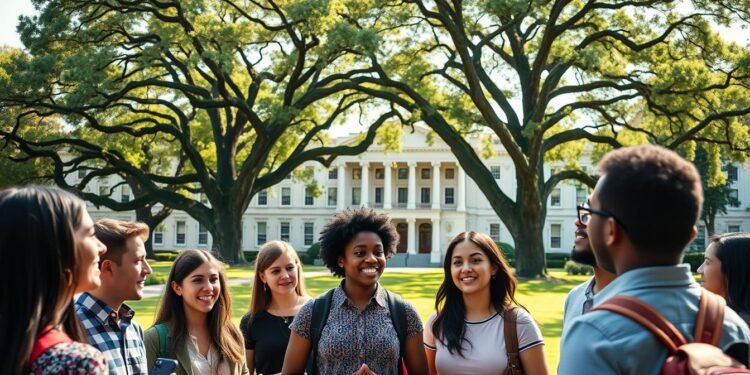Have you ever wondered how a single opportunity could transform your academic and professional journey? The Fulbright Scholarship offers just that—a chance to study, teach, or conduct research across 135+ countries. Sponsored by the U.S. government, this program is a gateway to global education and cultural exchange.
With over 400 awards annually, the program supports graduate students, researchers, and educators. Whether you’re interested in pursuing a research project or teaching English abroad, there’s a grant tailored for you. The application process is competitive but rewarding, opening doors to unparalleled academic and personal growth.
Eligibility varies by country, but the program welcomes applicants from diverse backgrounds. For U.S. citizens, it’s an opportunity to explore international education. For international scholars, it’s a chance to experience American academia. The 2024-2025 application cycle is now open, so don’t miss your chance to apply.
Key Takeaways
- The program operates in 135+ countries with 400+ annual awards.
- It supports graduate study, research, and teaching opportunities.
- Eligibility varies by country and program type.
- The application process is competitive but highly rewarding.
- The 2024-2025 application cycle is currently open.
What is the Fulbright Scholarship?
Since its inception in 1946, this program has shaped global education and cultural exchange. Established through Senator J. William Fulbright’s legislation, it was designed to promote mutual understanding after World War II. Today, it operates in over 135 countries, offering diverse opportunities for academic and professional growth.
The initiative includes two main tracks: the U.S. Scholar Program and the Foreign Student Program. Each serves distinct audiences but shares a common goal of fostering international collaboration. Over 8,000 awards are granted annually, supporting research, teaching, and graduate studies.
Notable alumni include 62 Nobel Laureates and 89 Pulitzer Prize winners, showcasing the program’s impact across academia, government, and the arts. Special initiatives, such as STEM-focused grants and recruitment efforts in Eastern Indonesia, highlight its adaptability to global needs.
Recent updates include changes to funding for Indonesian lecturers, with DIKTI-funded grants paused since 2021. Beyond academics, the program emphasizes community engagement, ensuring participants contribute to local cultures during their exchange.
Eligibility Requirements for the Fulbright Scholarship
Understanding the eligibility criteria is the first step toward securing this prestigious opportunity. The program has specific requirements tailored to applicants’ backgrounds, ensuring a fair and competitive selection process.
Citizenship and Residency
Applicants must meet certain citizenship and residency standards. For international candidates, dual U.S. citizenship is not allowed. Additionally, individuals cannot be residing in their target country at the time of application.
U.S. citizens must hold a bachelor’s degree but are not required to have a PhD by the grant start date. These rules ensure that the program remains accessible to a diverse pool of candidates.
Academic and Professional Qualifications
Academic excellence is a key factor. U.S. applicants need a minimum GPA of 3.0, while international candidates must demonstrate an outstanding record. Professional experience, such as leadership roles or community service, is also highly valued.
For Indonesian applicants, there’s an additional commitment: a five-year work requirement in their home country after completing the program. This ensures the skills gained benefit their local communities.
Language Proficiency
Language skills are crucial for success. Applicants must meet specific testing requirements, such as TOEFL ITP or iBT, depending on the application stage. Non-ETA grants often have higher language demands, so preparation is essential.
Certain fields, like clinical medicine, have restrictions, while STEM and humanities are equally encouraged. These guidelines ensure a balanced and inclusive selection process.
How to Apply for the Fulbright Scholarship
Applying for this prestigious program requires careful planning and attention to detail. The process involves several steps, from gathering documents to meeting deadlines. Understanding each component can help you submit a strong and competitive application.
Application Components
Your application will include several key documents. These typically include personal statements, project proposals, and legalized transcripts. For research grants, you’ll also need an institutional affiliation letter from your host institution.
Make sure your project proposal is clear and realistic. Unrealistic scopes are a common pitfall. Additionally, ensure all documents are complete and error-free to avoid delays.
Application Timeline
The timeline varies depending on your location and program type. For U.S. applicants, the process can take up to 15 months, with campus deadlines typically in August. Indonesian PhD candidates, for example, have a February 15 deadline with shortlisting in August.
Plan ahead to meet all deadlines. Late submissions are rarely accepted, so staying organized is crucial.
Tips for a Successful Application
Start early to give yourself enough time to prepare. Attend information sessions like Fulbright Week or NISO Week to gain insights. These events can provide valuable guidance on the process.
Leverage campus endorsement committees, similar to those at Purdue, for feedback. Finally, ensure your application reflects your academic excellence and professional experience. A well-prepared application significantly increases your chances of success.
Benefits of the Fulbright Scholarship
The benefits of this prestigious program extend far beyond financial support. Recipients gain access to a comprehensive package that includes tuition, airfare, and a living stipend. This ensures that participants can focus on their academic and professional goals without financial stress.
Health insurance is also provided, meeting USG-approved requirements. This coverage ensures that fulbrighters are protected during their time abroad. However, it’s important to note that dependent support is not included in the funding.
Professional advantages are another key benefit. Recipients gain non-competitive eligibility (NCE) for U.S. government jobs. This status can open doors to civil service positions, making it easier to transition into impactful roles after the program.
Cultural immersion is a cornerstone of the experience. Beyond financial support, participants engage deeply with their host communities. This enriches their understanding of global perspectives and fosters lifelong connections.
Post-grant opportunities are also available. Alumni associations provide continued networking and funding pathways. These resources help recipients build on their experiences and achieve long-term success.
However, there are some restrictions to consider. For example, English Teaching Assistants (ETAs) have workload caps, and all participants must adhere to a two-year home residency requirement after completing the program. These guidelines ensure the program’s integrity and long-term impact.
Conclusion
Securing this prestigious opportunity requires a clear understanding of the process and its competitive nature. Key deadlines vary by region, with Indonesian applicants facing February 15 and November 1 dates, while U.S. candidates must adhere to campus-specific timelines.
With acceptance rates as low as 20% for some programs, early preparation is crucial. Focus on language tests and developing a strong project proposal. Geographic priorities, such as the preference for Eastern Indonesian applicants, also play a part in the selection process.
Post-award requirements, including compliance with residency rules, are essential to maintain program integrity. For further information, attend Fulbright Week 2025 events to connect directly with advisors. Official resources like the IIE portal and country-specific commission contacts can address any remaining questions.
FAQ
What is the Fulbright Scholarship?
The Fulbright Scholarship is a prestigious international exchange program that provides funding for students, scholars, and professionals to study, research, or teach abroad. It aims to promote mutual understanding between the U.S. and other countries.
Who is eligible to apply for the Fulbright Scholarship?
Applicants must be U.S. citizens with a strong academic or professional background. Some programs require language proficiency, and eligibility criteria may vary by country and field of study.
What are the key components of the application?
The application typically includes a project proposal, letters of recommendation, academic transcripts, and a personal statement. Some programs may also require a language evaluation or additional materials.
When is the application deadline?
Deadlines vary by program and country, but most applications are due in the fall, typically between September and October. Applicants should check the specific timeline for their chosen program.
What are the benefits of receiving a Fulbright Scholarship?
Recipients gain access to funding for tuition, travel, and living expenses. They also receive opportunities for cultural exchange, professional development, and networking in their host country.
Can I apply if I don’t speak the language of the host country?
While some programs require language proficiency, others offer language training as part of the award. Applicants should review the specific requirements for their chosen program.
How competitive is the Fulbright Scholarship?
The program is highly competitive, with thousands of applicants each year. Strong academic credentials, a compelling project proposal, and clear alignment with the program’s goals are essential for success.
Can I apply for multiple Fulbright programs?
Applicants can only apply for one program per cycle. However, they may reapply in future years if not selected initially.








